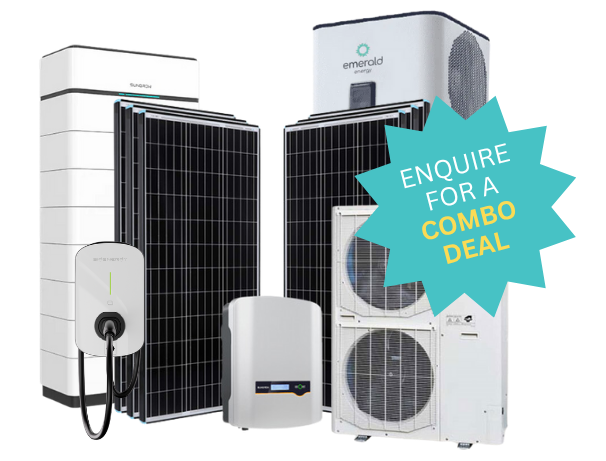Residential Solar Battery Installation & Storage, Melbourne
Your partner through every step of your renewable journey.
Towards a Zero Carbon Footprint Future.

CONVERT YOUR HOUSE FROM GAS TO ELECTRIC
ELECTRIFICATION OF YOUR HOME
Zero Energy’s Gas to Electric program is all about helping households make the smart switch from outdated gas systems to cleaner, more efficient electric solutions.
With generous government rebates available, there’s never been a better time to upgrade your heating, hot water, and cooking systems. Electric alternatives are not only cheaper to run and better for the environment, but also come with advanced technology for smarter, more comfortable living.
To maximise savings and energy independence, we also recommend installing solar panels and batteries—so you can generate your own power and store it for when you need it most. Make the switch today and step into a zero carbon future.
Step by Step, Towards a Zero Carbon Future.

Solar PV Systems
Water Heat Pumps
Solar Batteries
EV Car Chargers
Aircon & Heaters
CURRENT AVAILABLE REBATES
Unlock major savings with Zero Energy through a range of government rebates and incentives.
Our team helps you access every eligible rebate to reduce upfront costs and maximise your return on investment.






Solar PV System
Rooftop solar is one of the most effective ways to cut household carbon emissions.
A 6.6 kW system (roughly 18–20 panels) can generate around 8,000–9,000 kWh annually in Melbourne, supplying most of a home’s electricity and significantly reducing reliance on fossil-fuel-powered grid energy. This clean energy output can offset nearly 100% of a typical home’s usage, with excess fed back into the grid. Solar is a key part of Victoria’s net-zero goals, typically eliminating 5–8 tonnes of CO₂ per year.
It’s an essential step in transitioning to renewable energy and achieving meaningful environmental impact at the household level.
Solar Battery Storage Systems
Installing a home battery (e.g. 10 kWh) maximises the benefits of rooftop solar by storing excess energy for use at night.
While it doesn’t generate power, it boosts solar self-consumption—raising it from ~20–40% to 60–80% of total generation. This reduces reliance on fossil-fuelled grid electricity during peak times. A 10 kWh battery charged daily can store around 3.65 MWh annually, offsetting energy that would otherwise come from gas or coal plants.
By shifting usage to clean, stored energy, batteries enhance energy independence and contribute to significant carbon emissions reductions, particularly in states like Victoria with fossil-heavy grids.
Room Heating & Cooling Solutions
Switching from gas-fired HVAC to an all-electric ducted heat pump system significantly cuts fossil fuel use. Modern reverse-cycle systems offer both heating and cooling efficiently.
In Victoria, the average household uses around 50 GJ of gas annually for heating, generating about 2.5 tonnes of CO₂. Replacing this with a 16 kW heat pump powered by renewable electricity can eliminate those emissions. Government rebates support this transition, helping homeowners save up to $500 per year on heating costs.
Electrifying home heating is essential for achieving zero-carbon homes and reducing environmental impact while improving energy efficiency and year-round comfort.
Electric Hot Water Heat Pumps
Water heating is a major household energy use, often powered by gas or outdated electric systems. Replacing these with electric heat pump hot water units can reduce energy consumption by 60–75%.
For example, a heat pump may use only ~1,000 kWh annually versus ~3,000–4,000 kWh for old electric tanks, saving ~2,000–3,000 kWh and 1.7–2.6 tonnes of CO₂ per year. Replacing a gas unit also cuts ~0.8–1.0 tonnes of emissions. When powered by renewables, heat pumps can reduce emissions to near zero.
Experts call this one of the most cost-effective upgrades in a home’s transition to all-electric living.
EV Car Chargers
Transportation is a major contributor to carbon emissions. Switching from a petrol or diesel car to an electric vehicle (EV), especially when charged with rooftop solar, can drastically reduce emissions.
Petrol cars emit ~180–200 g CO₂ per km, while EVs charged from solar have near-zero operational emissions. Even on Victoria’s grid, EVs emit ~100–150 g/km—still significantly lower. With solar, every kilometre driven saves ~0.18 kg CO₂, achieving a 97% emissions reduction.
Pairing an EV with solar energy not only slashes running costs but also makes personal transport cleaner, helping households dramatically reduce their environmental impact while gaining long-term savings.
Why Zero Energy?

One Partner - One Stop Shop
Reduce your Carbon Emissions
Cost Effective and Environment Friendly

Zero Energy's Plant a Tree Program
Step from here
2
Switch HVAC System (Heating & Cooling)
3
Replace Gas Hot Water with Electric Heat Pump
4
Go Solar
5
Add a Solar Battery Backup
6
Complete your Gas to Electric Journey
Frequently Asked Questions
Can I install the battery in my garage?
Yes, you can. However, it usually comes at an additional cost due to compliance requirements. Every home is different, so please contact us for an exact installation quote.
Can I install a battery on my existing solar system?
Yes, you can. An AC-coupled battery is a great option for retrofitting a battery to your existing solar system.
Do you provide blackout protection with the installation of a battery?
Yes, blackout backup protection is available as an optional feature at an additional cost.
Can I get a battery to support my EV charger and home monitoring system?
Yes, we can help arrange that. Please get in touch with our team to explore compatibility with your specific brands and devices.
What Our Customers Say







